|
So fun! Here's what we did: We actually all wrote to the same prompt. We had several rounds and each time had volunteers read their writing to everyone, with the mic. The we switched partners. So we got to know different writers, too! 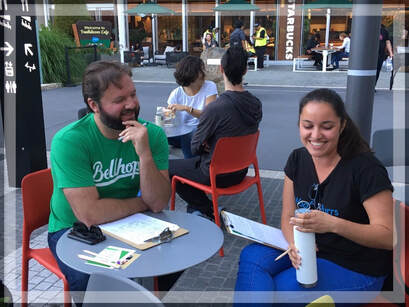 Here are some of the prompts: - calculated perforated holes - blue glow - riveted soaking trousers - overlooked misgivings As always, we were struck each time by how differently each writer responded to the same prompt! 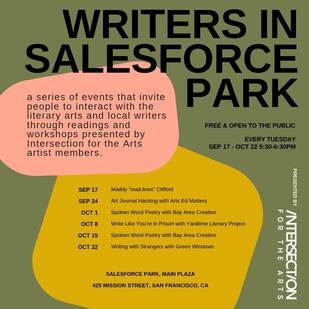 Stay tuned for more FLASH workshops!
0 Comments
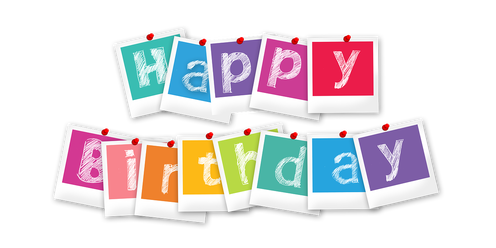 Green Windows turns 11 years old this month! For another 10 years, we need your support: Before September 30th, could you:
1. Take this 4-minute survey about your experience in our workshops? To go forward, we must be able to say what we've already done. 2. Donate $21? ($11 years + $10 more!) Thank you! We are a strong writing community thanks to YOU and your unique words. 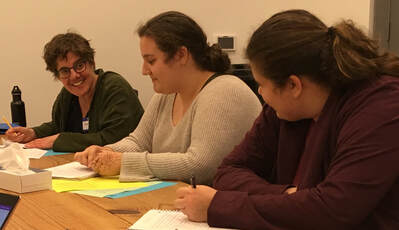 Peggy and two of the brilliant teen writers at BAMPFA, Spring 2019 Peggy and two of the brilliant teen writers at BAMPFA, Spring 2019 I love working with teenagers because I learn from them. And it's fun! I started working with teens in 1995, with the ATD Fourth World Movement in a vacation house for poor families outside of London. Teens said, "No one is working with us. Will you work with us?" I said, "Sure!" having no idea that I was making a career choice. One of those teens, Bea, and I continued to work together for several years within the youth branch of ATD Fourth World and she continued to work with teenagers well after she no longer was a teen herself. Bea and her mother, Moraene, both work as anti-poverty activists, as experts with first-hand experience of poverty. When I recently saw Moraene, at a conference in France, she introduced me to one of her colleagues: "Bea might have gone down a dangerous path if she hadn't met Peggy when she did." Youth workers often don't know the effect we really have, so that was wonderful to hear. But what was remarkable for me is that it's thanks to Bea that I've been working with teenagers, and loving it, for 24 years. Bea and I changed each other's lives, and those are my favorite stories. 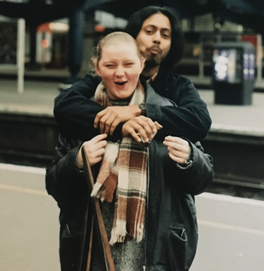 Bea and Meraz 1995 Bea and Meraz 1995 Teenaged Bea showed me around her Hackney neighborhood, told me stories about her life, introduced me to her friends, answered my questions and helped me figure out how to work with teens. She began my understanding of the struggles many teens face that I never had to face, but also of the strength, creativity and profound sense of justice that teens can bring to that struggle. After London, I spent four years working at the international center of the ATD Fourth World Youth Movement, outside of Paris. The Youth Movement brings young people from very different backgrounds together, as equals, in social justice, anti-poverty projects. I was working with young people from different countries, with different first languages, with widely varying formal education and literacy levels and facing very different kinds of challenges. There was Richard who lived with his Roma ("gypsy" or "traveller") community in a camp with no running water outside of Paris; Luke, who was going to University in Berlin who had had family on both sides of the wall; Marie who was learning circus arts to entertain children in hospitals in Brussels; and so many more. We brought them together very carefully and intentionally with a methodology that has been developed over decades and is now called Merging Knowledge. But even with this methodology and other techniques such as Theater of the Oppressed, and our purposeful facilitation, much of which I recognized later in "Restorative Justice" practices, I was consistently impressed with the capacity of these very, very different young people to overcome the barriers between them to fight for justice for all youth. That capacity gets dimmed as we grow older and I knew I had a lot to learn from it. This knowledge, of how much there is to learn from bringing very different youth together, was solidified after a group of Slovakian, French and Belgian youth I was leading on study trip in Bratislava was attacked by skinheads on a public bus. This is a story for another time, and one I have written over and over without ever being satisfied [we all have those stories]. But the most important part of the story, for me, was the incredible way the young people, who had not had an easy week, came together and supported each other in the days after the attack. In 2002, I moved back to the States, very much motivated by the desire to learn from young people in my own country like I had been learning from youth in Europe. While waiting in France for visas to come through for my French husband whom I had met in the Youth Movement, I put together a data base of youth-serving organizations in the San Francisco Bay Area. When we finally settled in San Francisco, we both found very interesting jobs in youth organizations and we were both shocked by how youth from "disadvantaged" backgrounds were being treated. The bar was consistently being lowered for them. Staff were condescending and preachy. And no one seemed interested in learning from the youth themselves. We had been trained to keep the bar high for all youth, knowing every youth would need different kinds of support to get there. We'd learned to be patient and persistent, creative and team-focused. Most importantly, we'd learned to listen to the youth themselves, as the experts on their own lives. My (now-ex) husband (and still best friend) eventually gave up on American non-profits which are overly guided by grant cycles and which put so much financial investment into executives who, especially at that time, seemed so far away from the lives of the youth they were meant to be serving. 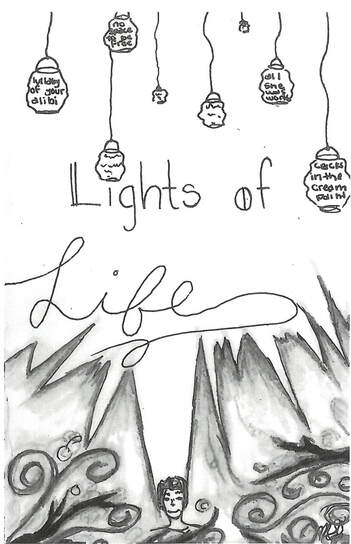 Teens made a zine at the end of the workshops at Berkeley Public Library, Summer 2019 Teens made a zine at the end of the workshops at Berkeley Public Library, Summer 2019 Eventually I found two organizations and one new methodology that would allow me to work with youth in a way I believed in outside ATD Fourth World: The Beat Within, The Oakland Public Library, and the Amherst Writers and Artists (AWA) writing workshop method. I've been volunteering with The Beat for eleven years in the local juvenile hall, and for the last year in San Quentin State Prison. The purpose of The Beat is to get the experience, thoughts and creativity of youth, especially incarcerated youth, out into the world through writing workshops and a magazine. The public library, for which I've worked, mostly part-time, for over ten years, is all about seeing the full complete person in front of you, finding answers to their questions, and being a gateway to knowledge sources and community they might not find elsewhere. The AWA method sees every person as a creative person and sees brilliance as being rooted in one being true to oneself. I've been using AWA in Green Windows workshops since 2008. Through all these jobs, bits and pieces of work cobbled together to almost make a living in the Bay Area, I have learned a lot from young people in my community. The boys killed on the street in the "bad" parts of my town (parts I live and work in, happily) aren't just boys, they are our boys. I know the shooters and the shot and know choices they face and choices they do not have. Thanks to The Beat, I know a lot of their hopes and loves and dreams and I've seen those turn to despair when their future is no longer imaginable. I bring these hopes and these despairs into everything I do and they make up one basis of my understanding of my community. I am not the same person when, for example, on the same day, I hear news that a 24 year old I've known since he was 15 got his sentenced reduced from 84-years-to-life to 2 more years in the state juvenile facility and news that another, age 19, a youth worker himself, was shot and killed sitting in his car with his girlfriend. I don't want to not know this. I want to know these young people and I want all my decisions to be affected by these events, these youth, these victories and these losses. Thanks to working with the Oakland Youth Poet Laureate program for the library, I get to listen to youth speak out on race, gender and justice in ways that my generation cannot manage with such articulation and honesty and respect. And being able to witness teen writers support each other in Green Windows workshops has taught me about listening, about imagination, and about what being true to oneself means today in ways that deepen my trust in the future of our society, if these youth can continue to be themselves and be safe. Today's youth give me hope. Not because they are simply the future, nor because of their own hope. Youth give me hope because they are brilliant, because I can see social progress made within them, because I have so much to learn from them, which means my own life is still evolving. We need to support them, trust them, believe in them, but not step back, not give over. As an adult, I want to continue to listen, to learn and to then see how I, with the wisdom and skills I've gained over fifty years, can help. Let me know if you, too, want to help. And I truly do simply enjoy the company of teenagers. And I am deeply grateful to be doing work I love. - Peggy Simmons PS -if the skills and experience I've gained working with teens over the years could be of use to your group - of adult or youth - please let me know! Every Wednesday in August, The New Parkway Cinema will give 20% of its ticket sales to Green Windows! It's Karma Night so you can also pay what you want for that ticket! We also need some help to table and talk about Green Windows workshops! From 5:45 - 7:30.
Let us know if you can come. 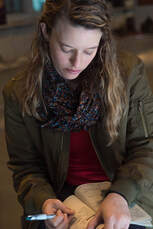 Catherine Mencher, Administrative and Operations Consultant, has been writing in Green Windows workshops for years. She has recently begun using her admin and operations skills a few hours per week to help Green Windows through this period of transition and growth. She's immediately become indispensable. Thank you, Cat! We asked her to share a little about her relationship with Green Windows as well as the powerful piece she wrote in the June Uniquely Yours workshop. Why do I support Green Windows: Art of Interchange? I hope to provide the Green Windows: Art of Interchange community with a drop of what it has given me – deep connections to folks with whom the daily rhythms of my life would not otherwise come into unison, a reconnection to how I cast myself as a child (as a writer) and a model for how to comprehend the world. Spaces like Green Windows are elusive in our face-in-screen society. How we participants write in Green Windows reveals and validates how we live. Some follow prompts with extreme fidelity, some throw them aside. By accepting the diversity in writing approach that others take, we see and honor their uniqueness, and in turn our own innate uniqueness. Green Windows inspires an authentic day-to-day curiosity, a wondering what each person we come into contact with would say if given a pen and paper and brought to our circle. In my new role, what will I do for Green Windows: Art of Interchange? I hope to increase the chances that someone comes into contact with the various offerings of Green Windows. The social media world can be a scary one, but I want to ensure Green Windows has a presence that increases the connections and long-term viability for its important work. I want to push the wheels on the grinding details, like data-keeping and grant-satisfying, so that Peggy can move the integral product, authentic connection and community-building, forward.  Lines by Catherine Mencher I didn’t like the aftermath. Jaw like sandpaper had scratched the bones and bases of the teeth. Memory of the lack of control, the learning that one tab of one finely hewed chemical could drop my inhibitions so totally. I didn’t like looking back at standing jittery in the line at Walgreens buying bottles of lotion. I kept that knock off lotion for almost a decade. Finally throwing it away before I finished it. One bottle of aloe still haunts my toiletry drawer. Knowing how thin our line of control is. I didn’t like what the chemicals in my mind had gotten me into the night before. I do love hearing you in the morning. I so never want it to end. As I sit today I want to keep making babies so I can always hear MOM in the morning. I’m grateful I don’t have a six am shift. How easy it would be for our disconnect to build if I couldn’t hold you every morning, couldn’t be in a privileged group who know what you look like when you fall back to sleep: the adorably adult way you reach your arms up to yawn, trying to push yourself back under that cloak of sleep when the light’s teasing the outside. I learned that I love strawberry cake when Jacob and Newton married. At some point the cake splat onto the grill at the wedding park. Erich, I love that you and a couple named Elizabeth and Maegan ate grill cake together and that we bonded about it in the bathroom line later. I don’t like the word usurp. It seems like a word describing something that I tend to support happening, but it has a sneaky, gnarly feel to it, like something done the less ingenuous way. I don’t like a lot of things anymore. I don’t like what it feels like when a baby throws rice all over the floor, which sticks flatly to your feet, requiring a peel off. I don’t like that caring for my child has made me bad at modeling austerity. How do I keep him hungry enough so he doesn’t waste food is not a question I ask myself much. I do like the concept of personal change. I’m frustrated by the litmus test put on people in power. Why are they held accountable to not changing? Isn’t changing what makes a human? 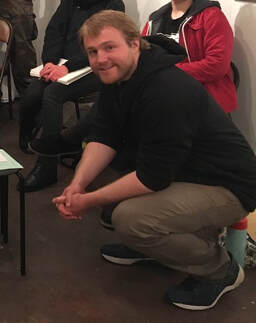 How can I combine my passion for the issues of education equity, prison abolition and youth solidarity in one poem written in one thirteen-minute sitting? If you had asked me before 7pm Sunday night I wouldn’t have been able to tell you, but as the sky changed hues we all straggled into a warehouse in North Oakland and sat down in semi-comfortable chairs for the Uniquely Yours workshop. We opened our notebooks and Peggy started feeding us prompts. A few new folks but most of us veterans of this workshop, coming almost every month and forming close-knit bonds around shared expression. I had something on the tip of my tongue but I couldn’t taste it, couldn’t form it into the words that I wanted. My muse felt like an astronaut suspended in deep space with nothing to hold on to. Then Peggy read the poem “Purple” by Alex Rotella and gave us the prompt, “Write about a moment when you were discouraged, or encouraged, or when you discouraged or encouraged somebody.” In this workshop it is assumed that everything we’re writing is fiction, even if it’s not. This gives us the freedom to write the truth while maintaining anonymity in our own experience. In other writing workshops I will write a piece and people will ask me about it as if the narrator is really me, Alec West, in real life, and the story I wrote was something that happened to me. Outside of Green Windows, I have to stop people and say, “This story is not about me.” I don’t want what I say in a story or a poem to affect the relationships I have with my friends, my family, my readers, or the community at large. Outside of Green Windows, this happens whether I like it or not, but within the safe space that we all create together, I can write whatever I want, plumbing the pits of my soul for something I would never admit to my closest friend. When I share those secrets with the people around me through my writing, they nod and listen and tell me what they liked about it, then we move on. It never has to enter the relationships I form with those people outside of the workshop and it never leaves the room. With the safety afforded by Green Windows I can write freely and do the kind of self-exploratory work I need to do among others in my community who are doing the same thing. I wrote this piece that night, based on that prompt. I thought about how discouraging it is for a teacher to have one of your students, someone much younger than you, die. I’m not revealing whether I’ve had that experience or not, but you can judge whether my writing resonates with you, and you can feel it if it is authentic. 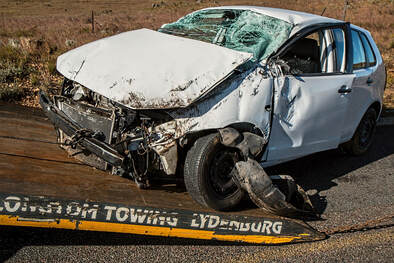 To Be Judged by Alec West At twenty-four I was young to be a teacher whose student had died. Ricardo had what you would call a magnetic personality. He was tall and solid with long hair that descended to his shoulders like the coned branches of a pine tree. He wore the jail uniform like any piece of clothing you would wear. He seemed to have an air of acceptance of where he was and hope for where he was going. Both of these combined with patience, faith that he would get there, that took confidence. I only remember him really writing one piece in all of the writing workshops we had. He attended a lot of them, as he was in jail for six months after I got there and I don’t know how long he was in before. Press play. Three months after he got out, a car crash. Ricardo was a passenger and he was dead. I’m not sure if he was 18 yet or not. I wrote in his obituary: “Almost as sad as his young death was how long he had to spend in jail.” Overall, Ricardo spent two and a half years in jail after he skipped out on probation to get a job so that he could support his family. A vast number of the people you will meet in jail are not there for their original crime, but for a violation such as staying out too late, or not checking in with their PO, things that are not illegal but could wind them back up in the system. Often these people are leading positive, productive lives and trying their best, but one misstep led them off track. How many people are lost to parole violations, not even real crimes? How many are trapped behind walls when they could be connecting or creating with us? What if you were judged and your whole life was determined by what you did or what happened on your worst day? There is a scene in the movie, “The Mustang” when a therapist asks a group of prisoners incarcerated for violent crimes, “How long from the idea of the crime to the committing of the crime?” 30 seconds. Fifteen seconds. Ten seconds. Less than half a second. The men answer with certainty as though a game show is asking them what they had for breakfast. Can you judge the entire character of a person for an action committed without making a decision? Do you feel safe? I’m young in my teaching and I’ve only had one student die. I’ve known teachers who have lived through the deaths of several of their students. The loss we feel is mixed with blinding injustice as the world becomes a little less colorful, a little less vibrant, and we all become a little less powerful, despite the efforts we as teachers put out every day to keep the fire burning in our students’ hearts. Our students get snuffed out. We put our dreams into these children, and these children give hope back to us. Then, the system takes these children, takes them away from the rest of us. I am a teacher and I am in my twenties and I’ve had a student die. You can judge whether I am too young or whether this is too much, but this is the world we live in. I’m not ready to make a judgment about the world, and Ricardo will always remain perfect in my memory. Do you feel safe? Alec West is a teacher, activist, and author of What Happened When I Stopped Watching TV, his first book, available on Amazon. He lives in Oakland, but is moving to Richmond, and was born and raised in the East Bay. You can find him on Facebook: on instagram @alecwestwriter510, or writing in a local cafe.
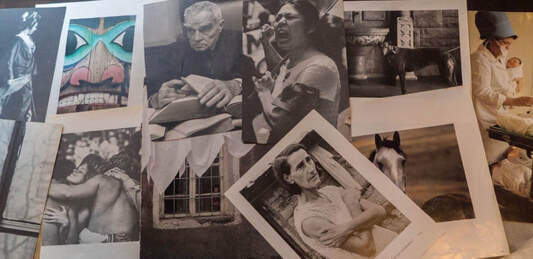 "Creative Dialogues" is a new name for work I've been doing for many years. With Creative Dialogues, I bring together my skills and experience facilitating groups using creative writing, theater, participatory research, and restorative justice methodologies. Creative Dialogues help people very different from each other get to know each other better and make progress together with their goals and challenges. Facilitation is about more than timekeeping and agenda-building. In any meeting or group gathering a good facilitator will strive to be aware of the whole space and everyone in it. Who’s dominating the conversation? Who’s not participating in any way? Who’s participating in subtle ways? Are we staying on topic? Are we understanding each other? Are we coming to a consensus if we need to? Can we hear each other? Do we need a break? Should a window be opened? A door closed? A facilitator is there for the group, not for themselves and the best facilitators are able to take themselves completely out of the conversation and help the group come to conclusions everyone will accept and in which they’ll see their own contributions. These outcomes aren’t always achievable by direct talking around a table. This is especially true when individuals are very different from each other, with divergent points of view, with varying language skills and/or educational backgrounds, some with more power than others, with differences that come with prejudice and bias, etc.. There are many techniques that can help with these challenging dynamics. Art and creativity can enable a group to level the playing field and grow understanding in indirect ways. Through facilitation techniques that ask us to create together and respond to each other creatively, understanding grows naturally, not through debate or winning arguments, and we are more able to see viewpoints different from our own. Let me know if a Creative Dialogue might be helpful for your group. Please contact me to arrange a free 20-minute phone consultation. More information here. I look forward to hearing from you. - Peggy Simmons Bertrell is a talented writer, painter, musician and filmmaker. We asked him how he chooses what medium he works in when he feels a creative urge. 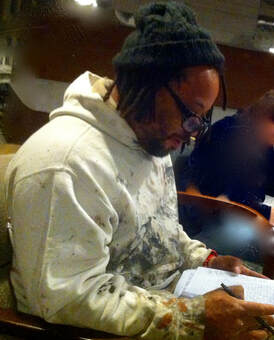 Drawings, doodles, paintings posted get hearts and likes from a handful of true trusty pals then the crickets swarm gets swinging with their usual number. Paper receipts, napkins and envelopes all add to the clutter on top of my empty Dj casket/desk/coffee table. Clutter becomes organized trash. I curse at my forgotten unwashed paint brushes with their dried paints. Latex gloves both used and new lay around the place. Some inside out with oil paint sticks and pastels nearby. They provide a sense of frenzy to the quarters. Cool repurposed panels and canvas find a tired wall to lean on or hang on. An up-to-par verse to a rap song gets stored in old and new cell phone notes app. I bet it must get cold in there while waiting for a chance at getting recorded. My composition notebooks stack up next to older cell phones arranged near or around music gear or related items. Yesterday's video clips got dragged and dropped into named files. Ha, I laugh to myself because I realize there is little hope of a video editor having their way with them puppies. I try to organize them tho, just in case someone comes thru on the pro bono tip or I find a budget to work with. I don’t clean up too much from any of these acts mind you. At times I feel like I lose intelligence with all this creating things. Yet I remain a happy hoarder of my own works for the most part. I Imagine I might gain better discipline and increase my coin collection if I was focused on marketing my artistic talents more so than creating them. This artist isn’t formally trained in any of the mediums that bully me into working with them. I just sorta keep things moving around me when I can. My only true job is to stay happy. This is how I think I choose what medium to work in when I’m creating, in short. Oh I’m artist in case I went over your head with my rambling. Okay, for starters paid commissions have never, I repeat have never, come my way so the task of what to do artistically doesn’t have a bottom line of what pays the bills. It’s become a completely cathartic ritual of twiddling thumbs. A few weeks ago I got asked by a friend to write this piece for a monthly blog. So a Blog Post it is, Peggy! And now I am writing, but wait, please note, I seldom lift a creative muscle in my body from an outside request, much like a good DJ. It’s usually an internal self-driven process and is not so cut and dry as this. I’m mostly fueled by my personal study of light and sound on my journey into film making. Note I’ve always had a tough time finding steady work in film production so music production and visual arts have been my down-time besties. Okay, back to the process of medium selection. It sorta goes like this on a good day, well approximately: Mee nee my nee Mo. Laughing out loud. No, it’s not that simple but it’s not too far off. A'ight, often I’m in between doing something that relates to a paying gig. Be it handyman help out with a property manager buddy to some carpentry or residential painting with a contractor pal. Add in helping a family member with something or other and I’m set. All of the aforementioned activities may or may not happen before I can get a good blank stare in at Rachel on MSNBC or Wolf on CNN. Then out of nowhere the Medium Muse Dealer hits me up. This is how our conversation goes most of the time: 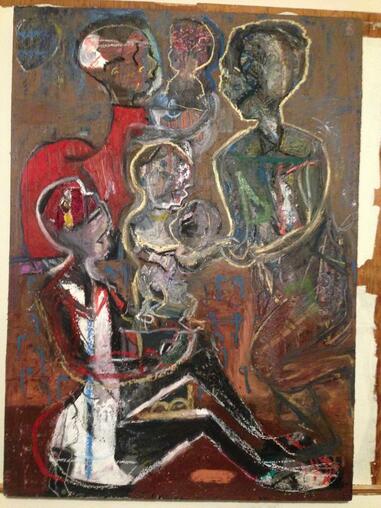 "something about family and babies" By Bertrell Smith "something about family and babies" By Bertrell Smith Medium Muse Dealer: What’s up with it? Me: Oh nothing much. What chu got up? What you smoking on? Medium Muse Dealer: Oh I’m busy, you know me, I keep it turned up . The better question, my man, is what you got up? You working? Me: Man, I’m always working. It’s a lifestyle. A movement. It’s what I am. I’m Work. You already know this. I wish you’d cut to the chase. Medium Muse Dealer: You funny as shit, yo, I dunno. I heard you had some slapping beats wasting away in that laptop you keep in yo backpack. I think we need to get to mixing them bitches down. Me: Me Slapping Beats? In my backpack? Mixing down? I’m not sure what you're talking about. Medium Muse Dealer: You got too many jokes. Me: Man, those bitches don’t love anymore. They just pretending. Medium Muse Dealer: Stop it Dude... you're tripping. Put those Sony’s on and talk to your music part for a hour or two. You owe it to the world, bruh. Come on. If not two hours maybe a half hour, a good 45 minutes or sumthin. Come on kid, stop fronting. Me: Naw, I’m cool. I got way too many channels to surf right now. Plus I got some lightweight depressing thoughts to muddle in. Maybe next week. Besides the crib is a mess. Medium Muse Dealer: I know what you mean. Well, fuck it then. Go on and take a picture of that canvas panel piece by the bathroom and post it. Gotta keep checking your phone for those ten likes, yo. Lol. Me: Haaaaa. A'ight a'ight only for a couple hours, tho. Several hours later after I have swapped out bass lines, added drum fills, guitar variations, panned DJ scratches and cuts, and added reverb and echos to songs that by this point I’m literally sick of listening to. Then I stop to see that the piece of art I thought was all that has gotten three likes. Unmoved I send a text to Thugette, call Moms and try to get some sleep. I awake and the process repeats with a different variation of actions. I get called and hustled by my Medium Muse Dealer about what creative endeavor they deem more urgent and I bargain my time down on the act and give in. Be it painting a picture, developing a story for a screenplay, or logging the points for edits on video footage. The Medium Muse Dealer basically owns me. Peggy, please send help  Here is a peek into Montez Price's Career Change Album that Bertrell is producing: https://soundcloud.com/dem-blanson/the-works  The Uniquely Yours monthly workshop started in March 2009! For ten years, these workshops have inspired all kinds of voices: ages 14 to 82, high schoolers, adults working on their AA, people with MFA’s, science fiction writers, poets, memoirists, children’s book writers, essayists, novelists, songwriters, homeless, renting, passing through, house-owning, from all corners of Oakland and all spots on the gender-queer spectrums, with various racial and cultural identities. Listening to the other people’s writing always amazes me--the variety that flows from the same prompt in the same town on the same evening. - regular Green Windows writer For ten years, writers have said they’ve done their best writing in this community. For ten years, we’ve offered a sliding scale workshop anyone can afford. For ten years, we’ve shown up consistently, out of belief in the writing and in the community, donating time and professional facilitationwhile paying way-under-market rent to The Rock Paper Scissors Collective, a grassroots organization that has been a cornerstone of the Oakland art community. For another ten years, with the increased cost of living in the Bay Area, we must find ways for this workshop to pay market value for facilitation and rent. For another ten years, we need your help. We need only $6,000 per year to make this work sustainable. Can you donate $10/month? https://tinyurl.com/donate2GW Thank you! I look forward to writing with you soon. - Peggy Read writing and testimonies from these workshops our blog. http://www.greenwindowswriters.org/blog/category/uniquely-yours #uniquelyyours4ten #uniquelyyours4tenyears Listen to why I think these workshops are special:
Our blogger this month, Roxanne Rocksteady Jones, first attended a Green Windows writing workshop in 2010 and has consistently written with us at every opportunity since. We asked her why she keeps coming back. 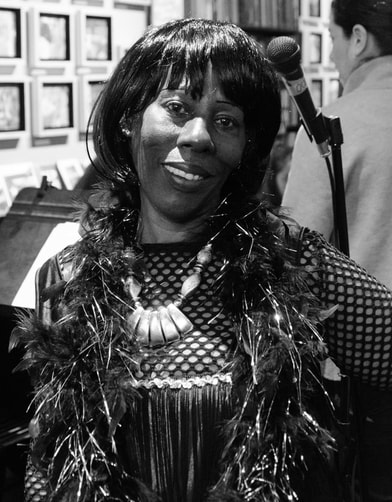 Roxanne at the Green Windows ten year anniversary reading. Roxanne at the Green Windows ten year anniversary reading. I keep coming back to Green Windows because I really got motivated when Peggy first invited me to the class to get over past things and express myself more. While I was taking the class, I went to a women's group and we had incense and candles and meditated and were asked to take whatever was on our mind and bothering us, from childhood to early age to teen to young adult to adult, and write it on a piece of paper, then read it to ourselves, then ball it up. It made me get rid of what was bothering me. I had been feeling like I had been tortured since a little girl. But as I wrote, I released things through the tears in my eyes, from my stomach, my belly, to my lungs to my throat, releasing it, throwing it up, freeing myself. So my writing is more like a journal: Instead of using my voice, I'm using my writing, screaming so the world can hear me. Instead of marching in the streets with the 99 women's march, I'm the 100th woman, marching with words. Young women, girls and teens are speaking up with their voices. You know, some people can't speak. Some people can't hear or talk. But they can read with their eyes. Reading, and other people reading your poetry or stories, is inspiring in either a happy way or sad way. They can learn to relieve what is bothering them, too. Now I'll hand a person a pencil, ink pen, or crayon and say, "I would like to hear your story. Would you like to write it down?" People think homeless people want money or food. Some people just want people to hear their story, to sit and listen, or release something, or just be quiet together. So asking them to tell their story, what's bothering them, they are like. “Oh, I just wanted you to hear this." Sometimes it doesn't make sense, but I don't care. They just want someone to listen. Most people don’t have time. For 2019 I would like for the city of Oakland or Green Windows to have an open mic where women, men too, but women, can say what's on their mind or what they went through, or what they want to release. Then we can give each other hugs after and let each other know we are loved no matter what gender, race, color or nationality. When I think about the violence done to people of color and queer people, I want say, “No matter your gender, we are praying for you, be strong, keep your heads up, know that you are loved. I hope they catch the racist haters out there who try to torture you. We are going to kill them with love because love is what makes the world go around.” Below is a piece of writing that I wrote in a Green Windows workshop. It was published in the 10-year anthology, Writing from Green Windows. Who’s Your Daddy?
By Sister Roxanne Rocksteady Jones Trick or Treats Mamas’ babies daddies’ maybies Who’s your daddy? Ok! Soul Sisters Girls, here we go Dancin’ to the beat of Aretha Franklin and Lady of Soul, Diana Ross and Lady Sings the Blues Here near downtown Oakland the block of 22nd, Telegraph and West Grand Ave which is now called Uptown Here on the sparklin’ psychedelic rainbow dance floor in this ol’ ol’ ol’ red brick building used to be the Pancake House which is now called Disco City Shakin’ our money maker as the mens would say Shakin’ what your Mama gave you Shakin’ our bootays Droppin’ it like it’s hot Girls just wanna have fun Actin’ like our Mamas’ drinkin’ brandy Courvoisier Vodka with pineapple juice and Gin Strawberry margaritas Laughin’ havin’ fun Cryin’ talkin’ about the good good ol’ days about the no good men who almost stole our hearts Rememberin’ the good good good ol’ ol’ ol’ days When our Mamas was also on the dance floor Partyin’ and shakin’ their old money makers Their groove things Their asses, as the ol’ men would say Drinkin’ brandy with milk 7 Up with Courvoisier Vodka with orange juice Gin with apple juice Dancin’ to the Temptations the Whispers Gladys Knight and the Pimps Dancin’ til’ the funkadelics the freaks Come out at night Dance song Shakin’ it Droppin’ it like it’s hot and our Moms cryin’ about our no good daddies on the dance floor as the Godfather of Soul, James Brown Sings the number one song Hot Pants I like the girl with the hot pants on She can do the boogie woogie all night long Oh my God, he’s singin’ about my Mama who’s your daddy? James Brown, Father of Soul Goin’ back to the good good good ol’ days Trick or Treat Who’s your daddy? Mamas’ babies daddies’ maybies |
Categories
All
Archives
July 2020
|
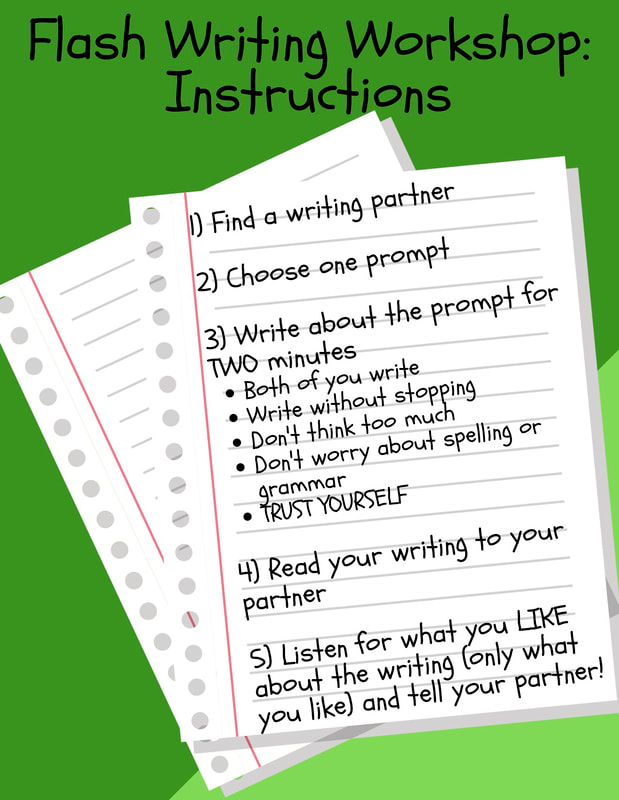
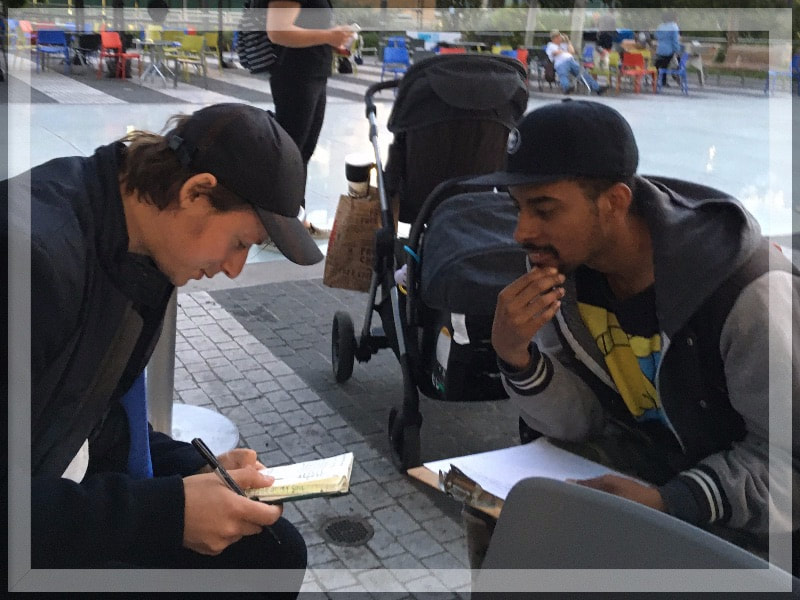
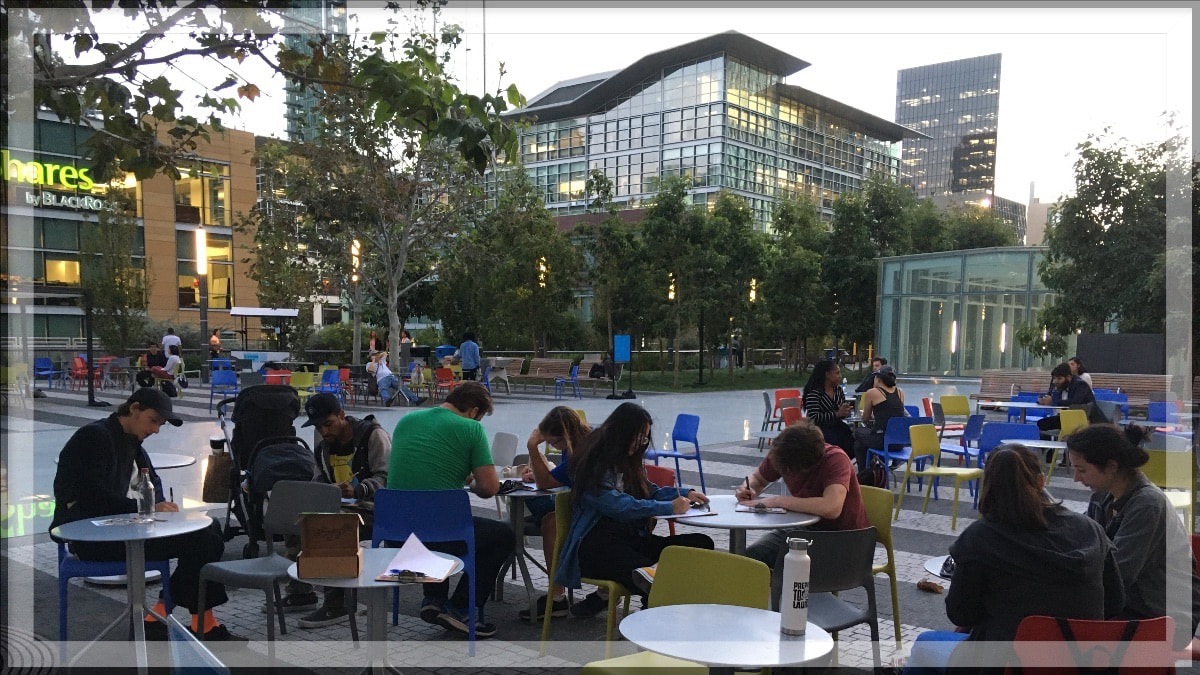
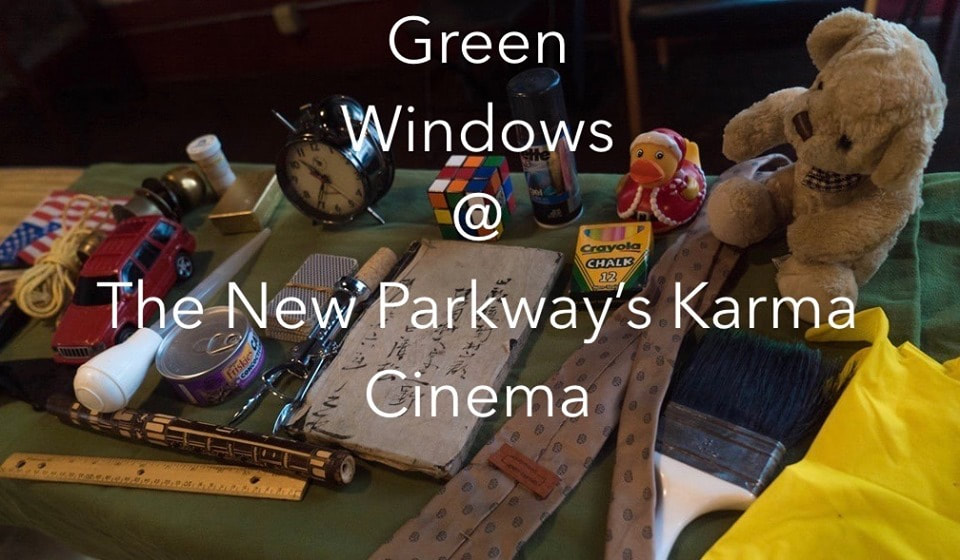

 RSS Feed
RSS Feed
